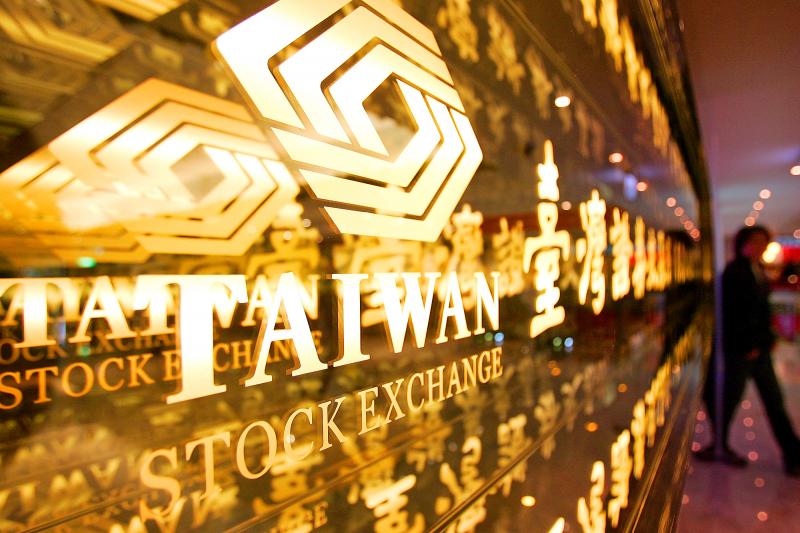The aggregate revenue of companies listed on the Taiwan Stock Exchange (TWSE) grew at a much slower pace last month, as financial companies’ investments were affected by the Russia-Ukraine war and optoelectronics companies saw falling demand, the exchange’s data showed.
The combined revenue of the 963 TWSE-listed firms edged up 1.66 percent from a year earlier to NT$3.11 trillion (US$104.7 billion), after growing 14 percent in March, the data showed.
The TWSE said that 507 companies, or 52.6 percent, reported revenue growth, while 456 companies posted declines.

Photo: Maurice Tsai, Bloomberg
The financial sector saw revenue fall by NT$52.8 billion, or 23.61 percent, annually to NT$170.8 billion last month, affected by market volatility and the Russia-Ukraine war, the exchange said.
It was the fourth consecutive month that the financial sector posted a decline, but last month’s fall narrowed from March’s NT$103.3 billion, it said.
For the first four months of the year, the financial sector’s revenue decreased by NT$156.1 billion, or 16 percent, to NT$799.8 billion, TWSE data showed.
The optoelectronics sector reported the largest fall in revenue last month, down 24.06 percent year-on-year to NT$94.7 billion, as flat-panel prices dropped and demand weakened, the exchange said.
LCD panelmakers Innolux Corp (群創) and AU Optronics Corp (AUO, 友達光電) reported that revenue declined 13.8 percent and 31 percent respectively last month, while smartphone camera lens maker Largan Precision Co (大立光) saw revenue contract 7.6 percent, companies’ data showed.
For the first four months, the optoelectronics sector reported that cumulative revenue dipped 8 percent to NT$434.7 billion, TWSE data showed.
The shipping sector’s revenue continued to rise last month on the back of higher freight rates, with sales advancing 60 percent to NT$158.5 billion, the exchange said.
The sector’s cumulative revenue in the first four months expanded 68 percent to NT$639.1 billion, it said.
The semiconductor sector, as well as the oil, gas and electricity sector, also continued to post strong revenue growth last month, the exchange said.
From January to last month, TWSE-listed firms’ aggregate revenue rose 9.89 percent from a year earlier to NT$12.9 trillion, TWSE data showed.

GROWING OWINGS: While Luxembourg and China swapped the top three spots, the US continued to be the largest exposure for Taiwan for the 41st consecutive quarter The US remained the largest debtor nation to Taiwan’s banking sector for the 41st consecutive quarter at the end of September, after local banks’ exposure to the US market rose more than 2 percent from three months earlier, the central bank said. Exposure to the US increased to US$198.896 billion, up US$4.026 billion, or 2.07 percent, from US$194.87 billion in the previous quarter, data released by the central bank showed on Friday. Of the increase, about US$1.4 billion came from banks’ investments in securitized products and interbank loans in the US, while another US$2.6 billion stemmed from trust assets, including mutual funds,

AI TALENT: No financial details were released about the deal, in which top Groq executives, including its CEO, would join Nvidia to help advance the technology Nvidia Corp has agreed to a licensing deal with artificial intelligence (AI) start-up Groq, furthering its investments in companies connected to the AI boom and gaining the right to add a new type of technology to its products. The world’s largest publicly traded company has paid for the right to use Groq’s technology and is to integrate its chip design into future products. Some of the start-up’s executives are leaving to join Nvidia to help with that effort, the companies said. Groq would continue as an independent company with a new chief executive, it said on Wednesday in a post on its Web

Micron Memory Taiwan Co (台灣美光), a subsidiary of US memorychip maker Micron Technology Inc, has been granted a NT$4.7 billion (US$149.5 million) subsidy under the Ministry of Economic Affairs A+ Corporate Innovation and R&D Enhancement program, the ministry said yesterday. The US memorychip maker’s program aims to back the development of high-performance and high-bandwidth memory chips with a total budget of NT$11.75 billion, the ministry said. Aside from the government funding, Micron is to inject the remaining investment of NT$7.06 billion as the company applied to participate the government’s Global Innovation Partnership Program to deepen technology cooperation, a ministry official told the

JOINT EFFORTS: MediaTek would partner with Denso to develop custom chips to support the car-part specialist company’s driver-assist systems in an expanding market MediaTek Inc (聯發科), the world’s largest mobile phone chip designer, yesterday said it is working closely with Japan’s Denso Corp to build a custom automotive system-on-chip (SoC) solution tailored for advanced driver-assistance systems and cockpit systems, adding another customer to its new application-specific IC (ASIC) business. This effort merges Denso’s automotive-grade safety expertise and deep vehicle integration with MediaTek’s technologies cultivated through the development of Media- Tek’s Dimensity AX, leveraging efficient, high-performance SoCs and artificial intelligence (AI) capabilities to offer a scalable, production-ready platform for next-generation driver assistance, the company said in a statement yesterday. “Through this collaboration, we are bringing two